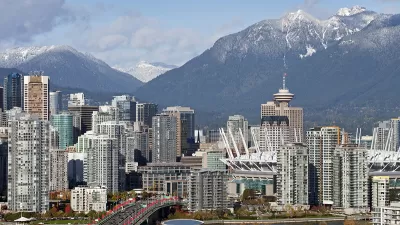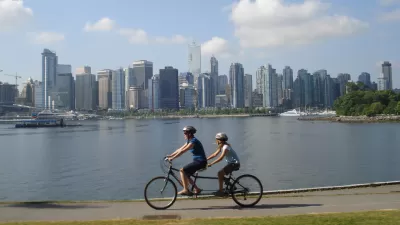The decision to rezone most of Vancouver to allow for duplexes could have consequences in this weekend's municipal election.

Elizabeth Murphy, a former property development officer for the City of Vancouver and for B.C. Housing, has penned an op-ed for the Vancouver Sun sounding an alarm about what she sees as a decade of the city forsaking Jane Jacobs in favor of Robert Moses.
The most recent example of Moses-like destruction of historic buildings in favor of new, dense development, is the city's recent rezoning to allow duplexes in 99 percent of the city.
There are a number of residential zones that allow new development with provisions that moderate demolitions and have demonstrated they keep this balance in check. These are called RT zones that are in parts of Kitsilano, Mt. Pleasant and Strathcona. These use incentives to retain and adaptively reuse existing character buildings, with disincentives to demolish, while allowing new development where appropriate.
These same principles can be used to create duplexes on a conditional basis rather than the outright duplexes that have just been approved citywide. The details of how a zone is crafted makes all the difference in terms of what the results would be.
The fact that the city chose not to use a more incremental approach, as suggested by Murphy, is called a "lost opportunity and a tragic mistake."
This discussion about recent zoning changes, along with additional discussion about the effects of the city's public transit projects, gives way to a call to action for citizens to vote according to their opinion of the Vancouver City Council's track record on matters of land use:
When deciding how to vote in the Oct. 20 civic election, look closely at how the current council has voted on the most recent citywide rezoning, as mentioned above, and vote accordingly. Greens and NPA voted against the rezoning, while Vision and Bremner (Yes Vancouver) voted for it.
FULL STORY: Elizabeth Murphy: Vancouver voters need to think about the city they want before they vote

Maui's Vacation Rental Debate Turns Ugly
Verbal attacks, misinformation campaigns and fistfights plague a high-stakes debate to convert thousands of vacation rentals into long-term housing.

Planetizen Federal Action Tracker
A weekly monitor of how Trump’s orders and actions are impacting planners and planning in America.

San Francisco Suspends Traffic Calming Amidst Record Deaths
Citing “a challenging fiscal landscape,” the city will cease the program on the heels of 42 traffic deaths, including 24 pedestrians.

Defunct Pittsburgh Power Plant to Become Residential Tower
A decommissioned steam heat plant will be redeveloped into almost 100 affordable housing units.

Trump Prompts Restructuring of Transportation Research Board in “Unprecedented Overreach”
The TRB has eliminated more than half of its committees including those focused on climate, equity, and cities.

Amtrak Rolls Out New Orleans to Alabama “Mardi Gras” Train
The new service will operate morning and evening departures between Mobile and New Orleans.
Urban Design for Planners 1: Software Tools
This six-course series explores essential urban design concepts using open source software and equips planners with the tools they need to participate fully in the urban design process.
Planning for Universal Design
Learn the tools for implementing Universal Design in planning regulations.
Heyer Gruel & Associates PA
JM Goldson LLC
Custer County Colorado
City of Camden Redevelopment Agency
City of Astoria
Transportation Research & Education Center (TREC) at Portland State University
Jefferson Parish Government
Camden Redevelopment Agency
City of Claremont





























